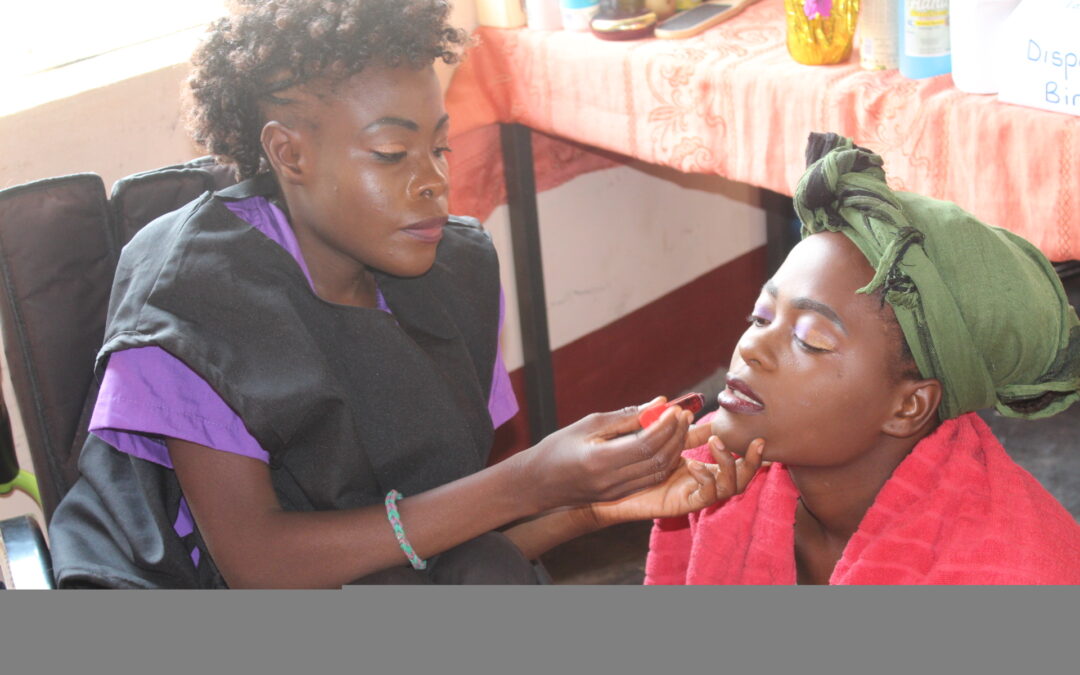
by ellen | Jul 18, 2022 | Blog, News
My name is Esnath Nyabadza and I am a 24-year-old young woman farmer from Ward 19 Moyoweshumba village in Mutasa District. I am a member of DAPP Farmers’ Clubs where I am learning conservation farming, smart agriculture and rearing of small livestock for improved food security, nutritional health and income.
I participated in DAPP demonstration plots on conservation farming where I learnt different techniques such as mulching, potholing, intercropping and the use of manure. From each of these techniques, I learnt a hands-on skill and how it promotes crop growth. The demonstration plots were my classroom and I replicated everything in my fields.
My production increased from getting five bags of maize to 14 which is enough for my family till the next harvesting season. I am even selling excess produce at the local marketplace and use the money to buy basic commodities. Budget lessons taught me the best ways to spend and save money something which is helping in boosting my other projects. I hope to continue producing more and expand my market linkages. However, there is very little to none in terms of support given by local government authorities to position local smallholder farmers well so that they can compete with large-scale farmers and imports. The trade imbalance is more acute for certain kinds of agricultural produce. There is, therefore, a need to encourage and enforce local content by laws tailored for the benefit of local women and smallholder farmers. The Local Content Strategy (LCS) is a strategy that can be used to encourage local value addition through localization of supply chains. It is my hope that the strategy will create economic linkages and business opportunities for local entrepreneurs. However, there is a need to implement a local project that focuses on market linkages and specifically identifies value chain roles that can attract youth to be active participants in local agricultural value chains. Looking to the future, I hope to see more women access new markets through group selling within Farmers’ Clubs and linkages to agricultural value chains. The DAPP model is one such model which can assist us with market linkages. I implore the Ministry of agriculture and food security and other relevant partners such as DAPP to continue supporting smallholder youth farmers with linkages to financial service providers that support women’s agriculture activities.

by ellen | Jul 1, 2022 | Blog, News
My name is Tarisai Mashanga and I am a 24-year-old young woman living with a disability. I come from Chipadze in Bindura District where I live with my unemployed grandmother. Being born with a disability made me a charity case relying on well-wishers. In academics, I ended at form two due to lack of finances, inaccessible learning environment for persons with disability and discrimination. Due to my little exposure, I had no means of making a living.
In 2019 I participated in Youth with Disability (YWD) networking groups established by Development Aid from People to People (DAPP) and Leonard Cheshire Disability Zimbabwe (LCDZ). Through these networks, we learnt more about our rights in line with the United Nations Convention on the Rights of Persons with Disabilities (CRPD), and entrepreneurship skills training to enhance livelihood opportunities. With help from my ward Councilor and Social Welfare, I was awarded a scholarship to study Beauty Therapy at Ponesai Vanhu Technical College (PVTC).
Being at PVTC helped to build my confidence and networking skills. Apart from my main line, I gained extra skills in creating a business plan, computer literacy skills and marketing skills. Finding attachment was not easy as few salon owners didn’t accommodate people with disabilities. However, through assistance from DAPP, I secured a place and I started building my client base. On graduation, I received a start-up kit and am renting a chair in one salon in Bindura Town. I also make house calls for hairdressing. I have moved from the charity case to the self– reliant mode and my dream is to be a renowned beauty therapist in Bindura. I am also now able to support my unemployed grandmother, who has been supporting me since my childhood.
I hope to see other youths with disabilities accessing scholarships for skills training at vocational training centers. I wish to see more investments in education and skills development through the establishment of more Vocational Training Centers in Zimbabwe.
I also appeal both to the Government through its relevant ministries like Ministry of Youths, Sports, Arts and Culture; Ministry of Women, Small and Medium Enterprise Development and developmental partners, e.g., DAPP, to join hands and capacitate Youth with Disabilities. This is because active engagement of Youth in sustainable development efforts, especially us with Disabilities, is central to achieving sustainable, inclusive and stable societies, thus averting our worst threats of being sexually abused. For the other Youths, this averts various social ills which include drug abuse, prostitution as well as reduces unemployment while promoting gender equality. Thus, there is a need for decentralized business networking hubs with supporting equipment and machinery for youths to be economically active at low cost. In addition, more grant allocation should be channeled towards youth entrepreneurship activities.


